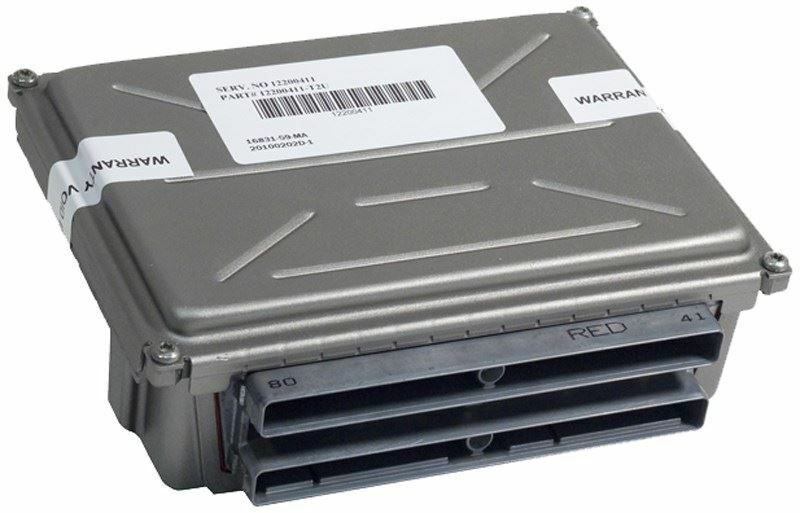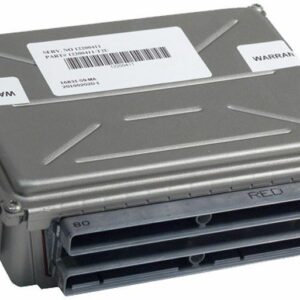Restore Your GM Vehicle’s Core Performance
As a technician with over two decades of experience under the hood, I’ve seen firsthand how a failing Powertrain Control Module (PCM) can bring a perfectly good workhorse like a 2003 Express 3500 Van to its knees. You might be dealing with frustrating no-start conditions, a persistent check engine light, or erratic engine behavior that makes you question your vehicle’s reliability. This isn’t just an inconvenience; it’s a critical failure of your vehicle’s brain. This replacement 2003 Express 3500 PCM is the definitive solution, designed to restore factory performance and get you back to work without the dealership hassle.
The biggest hurdle with PCM replacement has always been the programming. In the past, you’d buy the part, install it, and then have to get your vehicle towed to a dealer for an expensive flashing procedure. We eliminate that step entirely. Before this module ships, we flash it with the latest official GM software, precisely matched to your vehicle using the VIN you provide. This means it arrives at your door ready for a straightforward installation, saving you significant time and money.
Case Study: A Tricky Diagnosis
I remember a 2003 Silverado with the 8.1L that came into my bay with an intermittent no-start and random stalling. The owner had already replaced the fuel pump and crank sensor. Diagnostics were a nightmare; sometimes it would have spark and fuel pressure, sometimes not. After hours of chasing wires, we checked the PCM’s 5-volt reference signal and found it was dropping out unpredictably. A failing processor inside the module was causing a cascade of phantom issues. Installing a properly programmed PCM solved everything instantly. This is a classic example of how a faulty 2003 Express 3500 PCM can mimic other, more common failures.
Is Your GM Vehicle Exhibiting These Faults?
A failing PCM can cause a wide range of symptoms. If you’re experiencing any of the following, a faulty module is a likely culprit:
- ✔ Check Engine Light is on with communication-related Diagnostic Trouble Codes (DTCs) like P0601, P0602, or P0606.
- ✔ The engine will crank but refuses to start.
- ✔ Unexplained drops in fuel economy.
- ✔ Harsh or erratic automatic transmission shifting.
- ✔ The vehicle stalls for no apparent reason, either while driving or at idle.
- ✔ Your diagnostic scan tool cannot communicate with the PCM.
A Straightforward Guide to Installation
Replacing the PCM on these GM vehicles is a job most DIYers can handle. Here’s a basic guide to get you started:
- Safety First: Always disconnect the negative terminal from your vehicle’s battery and wait at least 15 minutes for the system capacitors to discharge.
- Locate the Module: On Express/Savana vans, the PCM is typically found in the LH rear of the engine compartment. On trucks and SUVs, it’s often under the battery on the driver’s side frame rail.
- Disconnect the Connectors: Carefully unlatch and remove the electrical harness connectors. They have locking tabs, so don’t force them. Inspect the pins for any corrosion or damage.
- Remove the Old PCM: Unbolt the module from its mounting bracket.
- Install the New PCM: Mount your new, pre-programmed module in place and securely fasten it.
- Reconnect Everything: Plug the harness connectors back in until they click, ensuring a solid connection. Reconnect the negative battery terminal.
- Perform Security Relearn (If Necessary): In some cases, a simple 10-30 minute security relearn procedure is needed. This typically involves turning the key to ‘ON’ for 10 minutes, ‘OFF’ for 10 seconds, and repeating two more times. Your vehicle will then start and run with the new module.
Verified Vehicle Compatibility
This module, part number 12578127, is a direct replacement for a wide range of GM vehicles and interchanges with several other service numbers, ensuring a perfect match. Please confirm your vehicle is on this list:
- Chevrolet Avalanche 2500 (2003)
- Chevrolet Blazer S10 (2003)
- Chevrolet Corvette (2004) – ID 12581565
- Chevrolet Express Van 1500/2500/3500 (2003)
- Chevrolet S10 Pickup (2003) – 4.3L
- Chevrolet Silverado Pickup 1500 (2003) – 4.3L
- Chevrolet Silverado Pickup 2500/3500 (2003) – Gasoline, 8.1L
- Chevrolet Suburban 2500 (2003) – 8.1L
- Cadillac CTS (2004) – Base, ID 12581565
- GMC Jimmy S15 (2003)
- GMC Safari Van (2003)
- GMC Savana Van 1500/2500/3500 (2003)
- GMC Sierra Pickup 1500 (2003) – 4.3L
- GMC Sierra Pickup 2500/3500 (2003) – Gasoline, 8.1L
- GMC Sonoma (2003) – 4.3L
- GMC Yukon XL 2500 (2003) – 8.1L
- Oldsmobile Astro Van (2003)
This part is also a direct replacement for service numbers: 12581565, IS 8125815650, 12570557, 12570558, 12576106, 12576869, 8125781270, 88864822, and 89017733.
Frequently Asked Questions
Do I need to do any programming after I receive this PCM?
No. We program the module to your vehicle’s specific VIN before shipping. It arrives ready for installation. A simple security relearn procedure may be required, which does not need any special tools.
What is a VIN and where do I find it?
The VIN is your 17-digit Vehicle Identification Number. It can be found on your vehicle’s registration, insurance card, or on a small plate on the driver’s side of the dashboard, visible through the windshield.
How do I know if this is the right part number for my vehicle?
You can match the part number directly from your old module or use our compatibility list. This part (12578127) replaces many alternate service numbers. If you’re unsure, just send us a message with your VIN, and we’ll verify the fitment for you.
Will this fix my check engine light?
If the check engine light is caused by a faulty PCM (e.g., codes P0601-P0606), then yes, this will resolve the issue. However, if the light is on for another reason (like a bad oxygen sensor), that issue will still need to be addressed separately.
Is this a simple plug-and-play installation?
Yes, for the most part. Once programmed to your VIN, the installation involves physically swapping the modules and reconnecting the harnesses. A key-cycle security relearn may be the final step, which is a simple procedure outlined in our guide.



